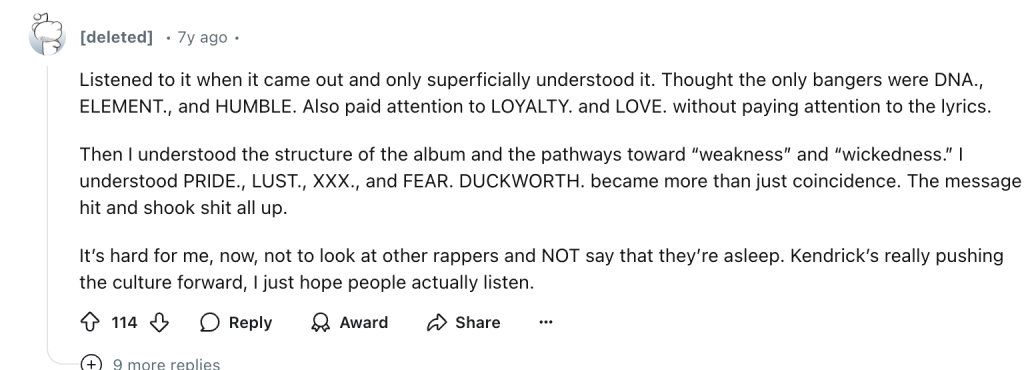When first hearing the words encoding and decoding messages, your first thought might be about spies sending encrypted messages and having to decode them to save the world’s fate. However, Stuart Hall referred to this in media as how producers encode a meaningful message through media for the audience to decode (Durham, 2006).
The encoding refers to the curation of a message in the form of media, and the decoding is how the message is understood. Decoding happens in three forms: dominant-hegemonic, negotiated and oppositional. The dominant-hegemonic reading is where the audience decodes the intended message as the producers intended. The negotiated reading is where the audience partly accepts the intended meaning; however, the meaning is adapted based on their beliefs and views. Finally, the oppositional reading is where the audience rejects the intended meaning due to their beliefs and views (Durham, 2006).
To understand how this theory works in practice, let’s apply this to Kendrick Lamar’s album DAMN. .The album was released on April 14th 2017, marking his fourth studio release, and stayed number one on music charts for four consecutive weeks on Billboard 200 (Mcphate, 2017). The album won numerous awards, including a Grammy for Best Rap Album and a Pulitzer Prize. Critics have praised Kendrick for his lyrical ability, and he is regarded as a “Master storyteller” (Trammell, 2017).
How does DAMN. relate to the encoding and decoding model?
DAMN. is a perfect example of understanding the model as it encodes multiple cultural and social themes that allow different forms of decoding to occur. The album consists of 14 songs that encode messages of systemic racism, religion, fate, police brutality and the struggles of African Americans within an oppressive society. The album is not inherently meant to be political but should bring the listeners’ attention to these societal problems. However, how the album is encoded allows for different interpretations and understandings; this is where the decoding positions are applied.

Dominant hegemonic reading: These listeners accept the meanings Kendrick encoded through the songs and take the album for what it is: a social commentary on the struggles faced by marginalized groups within an oppressive society; this is decoded through the songs “DNA” and “Humble”.
Negotiated reading: These listeners will understand the encoded meanings but may alter the message to fit their particular views or beliefs. For instance, some listeners may agree with the themes and concepts Kendrick highlights in the album, but due to the language in the songs and the production, some listeners may be put off and believe that it is too aggressive or violent.
Oppositional reading: These listeners outright reject any of the meanings put forth due to their own beliefs, or they might misinterpret the meanings of the songs. The song “XXX” can be rejected by listeners because of the underlying message about systemic racism within America (Rhiannon, 2017), and due to their own experiences and biases, they view this song as overly political, thus rejecting the message.
To conclude, the encoding and decoding model helps us understand how, based on people’s personal beliefs and experiences, it can alter the intended meaningful messages that producers try to put forward through various forms of media.
References
Durham, M.G. and Kellner, D. (2006) Media and cultural studies: keyworks. Rev. ed. Oxford: Blackwell. (Accessed: 16 November 2024).
Hsu, H. (2017) ‘Stuart Hall and the Rise of Cultural Studies’, The New Yorker [Preprint]. Available at: https://www.newyorker.com/books/page-turner/stuart-hall-and-the-rise-of-cultural-studies. (Accessed: 16 November 2024).
IMDB (no date) Kendrick Lamar: Humble. Available at: https://www.imdb.com/title/tt6723550/?ref_=tt_mv_close (Accessed: 16 November 2024).
Mcphate, T. (2017) Grammy. Available at: https://www.grammy.com/news/kendrick-lamar-damn-returns-no-1-spot (Accessed: 16 November 2024).
Rhiannon, A. (2017) Bustle. Available at: https://www.bustle.com/p/kendrick-lamar-u2s-xxx-lyrics-are-about-speaking-truth-to-power-51233 (Accessed: 16 November 2024).
Trammell, M. (2017) Pitchfork. Available at: https://pitchfork.com/reviews/albums/23147-damn/ (Accessed: 16 November 2024).



This blog provides a clear and engaging application of Stuart Hall’s encoding and decoding model to Kendrick Lamar’s DAMN.. I appreciate how the writer breaks down the theory and connects it to specific songs, making abstract concepts more tangible and relatable. The explanation of the three decoding positions—dominant-hegemonic, negotiated, and oppositional—is particularly well-articulated, and the examples of how different listeners might interpret Kendrick Lamar’s work bring the theory to life. The use of references adds credibility and depth, showing a well-researched effort.
I have a little suggestion related to explore how DAMN.’s themes resonate differently across cultural contexts or with international audiences. Adding this layer of analysis could further enrich the discussion and demonstrate how encoding and decoding vary globally. Overall, this is an insightful and thought-provoking blog! I hope my little suggestion is helpful to you.
Very interesting!!! The way you break down the album’s themes and link them to decoding positions really captures how music can provoke diverse reactions. I especially liked your example of “XXX” and how some listeners might dismiss its message because of their biases—such a clear illustration of oppositional reading.
Something I kept thinking about while reading was how DAMN. feels like it was made to challenge people, to force them into those negotiated and oppositional positions. Maybe that’s part of its genius—it doesn’t let everyone stay in the dominant-hegemonic zone.
You have a very enthralling way of writing, I really enjoyed reading this. As someone who rarely pays attention to the lyrics and meanings of songs, it was very interesting to read how Kendrick Lamar purposefully encoded the meaning, although the album wasn’t supposed to be inherently political. Because music is so subjective, I think it is a great example to highlight how people’s backgrounds, cultural experiences, opinions etc. can influence their decoding process. To have a variation in interpretation is what makes art so interesting to me – understanding other’s viewpoints and listening to their thought processes adds a whole new layer to decoding meaning – whether it be the intended decoded meaning or not. That’s why I appreciate you mentioning (and Kendrick Lamar making/encoding it) so it allows for different interpretations. Your description of the decoding/encoding model made a lot of sense, I will definitely be more mindful when listening to songs in the future, to see where I fall in the decoding positions!
On a side note, I believe Imagine Dragons – Evolve should’ve won Album of the Year 😉